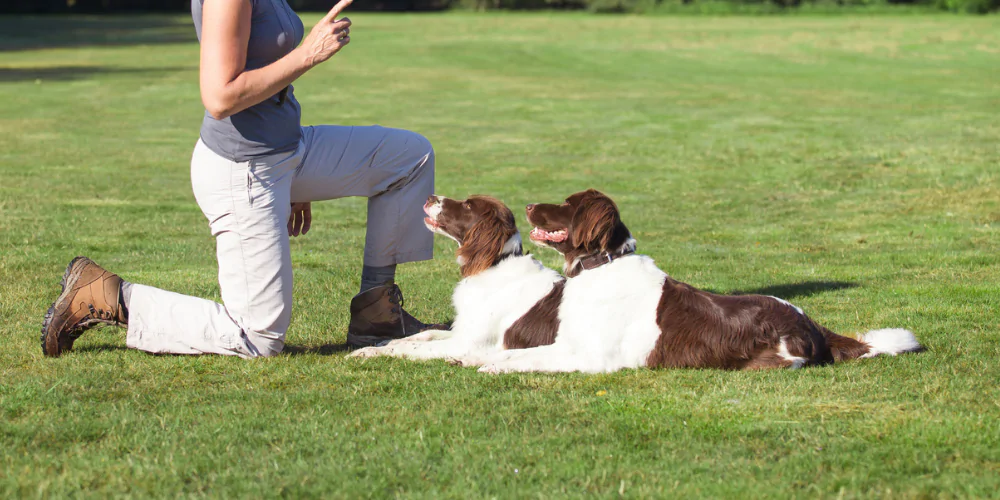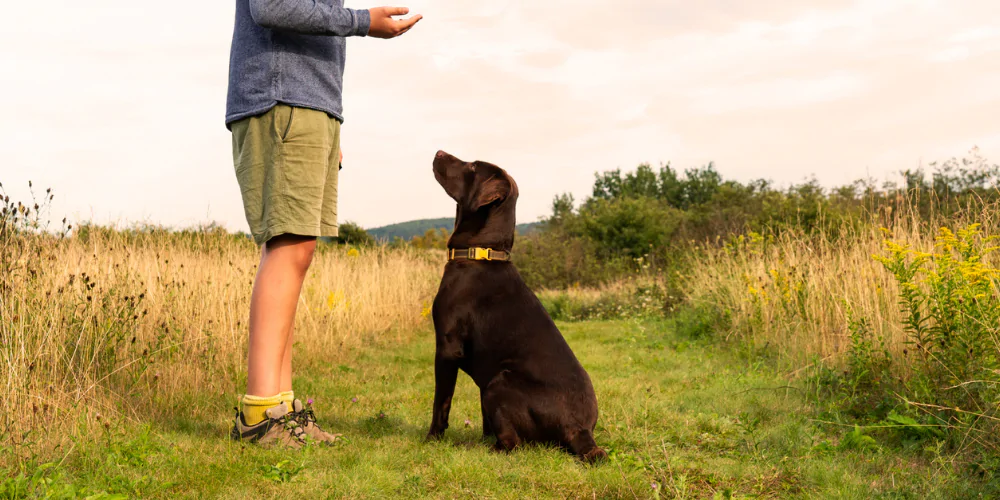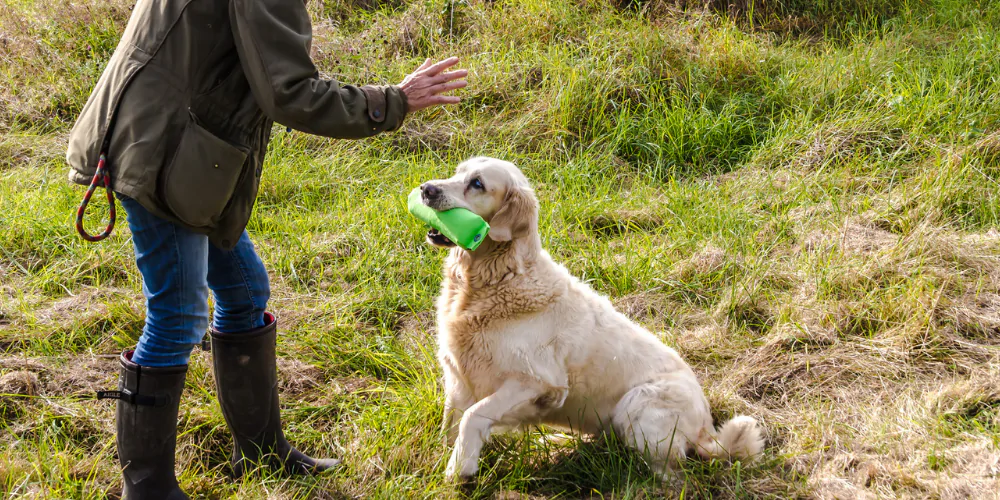
Do I need a dog behaviourist or trainer?

Philippa Short
3 May 2022 | 10 minutes read
Like humans, canines are complex beings with lots of physical and emotional needs. Sometimes you’ll need an expert to help them live their best life – and that’s where dog behaviourists and trainers come in. Dog expert Philippa Short breaks down the differences between the two, how to know which one you need, and what you could pay.
- What’s the difference between a dog behaviourist and a trainer?
> Differences between dog behaviourists and trainers – Animal Behaviour Training Council
> Differences between dog behaviourists and trainers – UK Dog Behaviour and Training Charter - How do you know when you need a dog behaviourist versus a trainer?
- How do you find a dog behaviourist or trainer that uses positive reinforcement techniques?
> Are there breed-specific dog experts and should you go to them for training and behavioural issues?
> Are there dog behaviourists who specialise in different behavioural issues? - Do dog behaviourists and trainers work?
- How much does a dog behaviourist cost?
- How do I claim for behavioural issues through my pet insurance?

What’s the difference between a dog behaviourist and a trainer?
Did you know that you don’t legally need any formal qualifications to become a dog behaviourist or trainer? That’s why it’s so important to do your research when looking to work with someone. There’s a lot of people out there passionate about helping you and your dog. But if they don’t have any training, they could potentially do more harm than good for your pup.
There’s lots of dog behaviourists and training organisations in the UK. While there’s no official regulatory body, many of these groups have joined two large umbrella bodies – Animal Behavioural Training Council (ABTC) and UK Dog Behaviour and Training Charter.
Part of what these bodies do for the industry is bringing:
- Improvement in dog welfare
- A clear understanding of what is and isn’t acceptable in the profession
- A set of common values, ethics, and ways of conduct for everyone to follow
- A need for qualifications or training
- Support to its members
- New research and ideas to the table
So you want to look for a dog behaviourist or trainer that’s part of a membership group under either of these bodies. This shows they should follow ethical practices and meet specific training and qualification needs.
Animal Behavioural Training Council and UK Dog Behaviour and Training Charter each have their own needs for trainers and behaviourists, so let’s look at the differences.

> Differences between dog behaviourists and trainers – Animal Behaviour Training Council
Animal Behavioural Training Council members sit under one of five different roles, depending on their qualifications and experience.
Dog trainers:
- Animal trainer (ABTC-AT) – this is their lowest level animal trainer. Holds a level 3 animal qualification and can train animals directly, but not their owners.
- Animal training instructor (ABTC-ATI) – holds a level 3 animal qualification and has a qualification/experience in coaching people. Can train the animal directly and also coach owners on how to teach their dogs.
Dog behaviourists:
- Animal behaviour technician (ABTC-ABT) – this is their lowest level animal behaviourist. Holds a level 5 animal qualification. Can’t work with aggression (dog to dog or dog to human) but can work with other behavioural issues like fear and separation anxiety.
- Clinical animal behaviourist (ABTC-CAB) – holds a degree level (level 6) animal qualification. They can work with any case and behavioural issue but must refer to a vet for modification drugs.
- Veterinary behaviourist (ABTC-VB) – holds a degree level qualification as a certified vet. Along with working on any case, they can diagnose and prescribe behavioural modification drugs.
Dog member organisations under ABTC:
- APBC – Association of Pet Behaviour Counsellors
- APDTUK – Association of Pet Dog Trainers UK
- FABC – Fellowship of Animal Behaviour Clinicians
- Gun Dog Trainers Academy
- IAABC – International Association of Animal Behaviour Consultants
- KPA – Karen Pryor Academy
- Dogknows
- PACT – Professional Association of Canine Trainers
- Puppy School (franchise)
- CBTS – Canine Behaviour and Training Society

> Differences between dog behaviourists and trainers – UK Dog Behaviour and Training Charter
Members of the UK Dog Behaviour and Training Charter are classed as either trainers or clinical behaviourists:
- Trainer – has a level 3 qualification and can train both the dog and the owner.
- Clinical behaviourist – has a level 5 qualification or above and at least 5 years experience.
Member organisations under UK Dog Behaviour and Training Charter:
- ACE – Animal Centred Education
- APDTUK – Association of Pet Dog Trainers UK
- CAPBT – COAPE Association of Applied Pet Behaviourists and Trainers
- ICB – International Canine Behaviourists
- IMDT/IMDTB – Institute of Modern Dog Trainers and Behaviourists
- Association of INTODogs
- UK College of Scent Dogs
- PPG – Pet Professional Guild (US and EU)
- PPGBI – Pet Professional Guild (British Isles)
- VSPDT – Victoria Stilwell Positively Dog Training
Each organisation has certain standards for membership. For example, a minimum amount of continuous professional development (CPD). This means doing regular training courses to keep up to date with new techniques.
The Dog Training College and Kennel Club are not currently registered to either ABTC or UK Dog Behaviour and Training Charter.

How do you know when you need a dog behaviourist vs a trainer?
If you need to teach your dog something, you need a dog trainer. This could be things like:
- Housetraining
- How to settle as a puppy
- Loose lead walking
- Recall
- Sit, down, stand, and stay
- Agility work
- Scent work
- Tricks
- Gun dog or herding work
The instructor will talk you through how to break down an exercise for your dog. They’ll then show you how to rebuild the exercise so your dog can learn in a positive way. The idea is you’re helping your pup have a good emotional response to learning.
If there is a behaviour that you don’t like because it’s inappropriate or abnormal for the species of your dog, you need a behaviourist. This could be things like:
- Separation anxiety
- Aggression towards other dogs or people
- Noise sensitivity
- Abnormal repetitive behaviours (more commonly known as OCD)
- Fear or anxiety
- Resource guarding
- Stress
Every possible cause of the behaviour is looked at during a dog behavioural consultation. There’s likely to be a lengthy form and longer initial consultation. The behaviourist will take into account:
- Breed
- Age
- Litter behaviour and history (if known)
- Rescue history (if known)
- Diet
- Daily routine
- Timeline and escalation of the behaviour
- Emotions of the family toward the dog and the behaviour
The dog behaviourist will then work on goal setting and a behaviour modification plan, which is split into management and training.
Still not quite sure? Try reaching out to a dog expert who’s qualified as both a trainer and behaviourist. They can chat through your pup’s issues and decide what kind of support they need.

How do you find a dog behaviourist or trainer that uses positive reinforcement techniques?
To find a positive reinforcement dog behaviourist or trainer:
- Check they’re a member of an organisation that’s registered with ABTC or UK Dog Charter – these groups have terms of membership against the use of negative training equipment techniques.
- Read through their whole website – see what they’re telling you about their journey to becoming a trainer or behaviourist, whether they used reward-based training.
- Speak to them through a call, chat or email – see if they come across as passionate, caring, and have a dog’s best wellbeing at the heart of what they do.
- Find the right fit for your dog, not someone else’s – just because they’ve been recommended to you by a fellow dog owner, they might not be the right choice for your pooch.

> Are there breed-specific dog experts and should you go to them for training and behavioural issues?
Most dog behaviourists and trainers work with all breeds of dogs. So many people who focus on specific breeds may not have up to date training or qualifications and could use outdated techniques.
It’s why you always want to look for someone who’s registered with the ABTC or UK Dog Charter. You’ll have the confidence that they’re fully qualified with up to date training and follow strict ethical practices. If they are also specialists in a certain breed, great!

> Are there dog behaviourists who specialise in different behavioural issues?
There’s no specific qualifications for individual behaviours, so all dog behaviourists are fully qualified and capable of taking on any issue.
But it’s completely up to the behaviourist which cases they want to work on – and some people do like to specialise in certain behaviours.
One of the more popular behavioural specialisms is separation anxiety, especially with the big increase of new owners during lockdown.

Do dog behaviourists and trainers work?
So, do dog behaviourists and trainers actually work? It’s a fair question, but the answer depends on a few things:
- Choosing a dog behaviourist or trainer who’s fully qualified, with the right amount of experience
- Keeping to the training or support plan they’ve given you
- Understanding that it can take time to see improvements
- Being prepared for unexpected curveballs that make you pause and reset or try something different
And there’s one other major thing to keep in mind here – sometimes, you’ve just picked a breed whose traits don’t match your lifestyle. If you’ve not done the right research on the type of dog you’re getting, you might get a clash.
For example:
- You get a sheepdog puppy from a farm with working parents.
- You bring the puppy home and they try to herd family members, along with some potential nipping.
- Although this is natural herding livestock behaviour, it isn’t what you want at home.
- You now have a normal breed behaviour that’s being shown at an inappropriate time to your lifestyle.
So always read as much as possible about the breed and learn about the parents to know if you’ve found the right fit for your home.

How much does a dog behaviourist cost?
Behaviouralist support is not a quick fix, as it looks at deep-rooted issues. The cost of a dog behaviourist depends on the individual dog and their needs. And it’s important to keep in mind that complex behaviours will need more time and support.
For example, dogs with separation anxiety usually need to work with a behaviourist for at least six months. But sometimes a behaviourist may refer a dog to the vet. This is because they suspect an undiagnosed medical condition could be a big cause of the problem. Getting diagnosed and treated then helps to reduce much of the unwanted behaviour.
The cost of the behavioural treatment and support plan takes into account:
- Your dog’s nutrition
- Any potential medical issues
- Your dog’s history
- What and how many things are affecting or causing the behaviour
- Your ability as an owner to follow the recommended advice
A behavioural consultation package with Animal Friend, for example, starts at £200. With a bronze package you get:
- Two to three hour Zoom consultation
- Follow up report
- One hour online follow up, four to five weeks after the initial consultation

How do I claim for behavioural issues through my pet insurance?
Check your policy wording or speak to your insurer directly to find out how to claim for behavioural issues through your pet insurance.
To claim for behavioural issues through your dog insurance policy, first check what is and isn’t covered:
- Use your free 24/7 access to FirstVet to arrange a video consultation or book an appointment with your local vet.
- Talk through the behavioural issues – if appropriate, your vet will recommend treatment or therapy.
- Your pet will then need to see a vet or certified clinical animal behaviourist.
- They can also see a member of the Association of Pet Behaviour Counsellors (APBC), Canine and Feline Behaviour Association (CFBA), or a certified animal behaviourist from the International Companion Animal Network.
- Fill in the online claims form – you can either claim back the cost of the sessions or ask Petsure to pay the behaviourist directly.
- You can claim for up to 12 sessions of behavioural treatment or complementary therapy in total each policy year.
Get a quote for behavioural treatment and complementary therapy for a Petsure dog insurance policy.
*All information given in this article is correct as of 20 April 2022.


